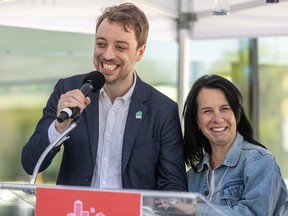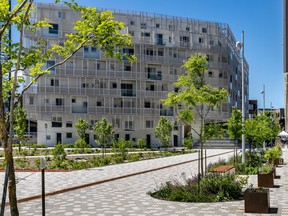Mayor Valérie Plante and her administration rolled out a new initiative on Thursday to accelerate construction of affordable housing in Montreal, announcing a $21.4 million “portfolio” grant to a non-profit affordable student housing developer to support four of its projects in one shot.

Article content
Mayor Valérie Plante and her administration rolled out a new initiative on Thursday to accelerate construction of affordable housing in Montreal, announcing a $21.4-million “portfolio” grant to a non-profit affordable student housing developer to support four of its projects in one shot.
The city already provides direct funding to non-market housing projects destined for low and modest-income people. The idea behind the larger “portfolio” grant to an organization that has multiple projects on the table is to speed up their construction by eliminating the need to wait on funding applications for each individual project, Plante said at a news conference attended by other city officials and by Laurent Levesque, the president and CEO of UTILE, the non-profit company receiving the funds.
Advertisement 2
Story continues below
Article content
“When we say that we want to facilitate the process, accelerate construction starts, a ‘portfolio’ agreement will allow in this case UTILE to start several projects in one shot to be able to move more quickly,” Plante said, adding that the large, long-term grant provides the non-profit developer predictability and something to leverage to obtain other financing.
“Instead of looking at piecemeal opportunities, we offer the non-profit promoter a massive envelope from the start so that all development opportunities are there.”
“It’s the first, but not the last,” city executive committee vice-chairperson Benoit Dorais said of the “portfolio” grant. A second such grant is to be announced in the coming days, he said.
Since 2020, UTILE, which stands for Unité de travail pour l’implantation de logement étudiant, has constructed three affordable student apartment buildings in the province where it charges 10 to 30 per cent below market rents. Two of the buildings are in Montreal and one is in Quebec City. Annual rent increases in UTILE buildings are also below market increases to ensure long-term affordability.
Article content
Advertisement 3
Story continues below
Article content
UTILE’s four projects receiving the $21.4 million from Montreal will have 670 units combined and house about 1,000 students, Levesque said.

One of the UTILE projects receiving the city funding is a highrise with 285 units for about 358 student tenants called the Cardinal and planned to start construction in Griffintown this year. It’s expected to welcome its first tenants in 2027.
A second project, called The Rivernote, is being developed in Pointe St-Charles with the Concordia Student Union. The 95-unit apartment building, which would house about 208 tenants, is expected to begin construction next year and be completed in 2026.
The third project is for 149 apartments housing about 235 tenants on St-Hubert St. in Plateau Mont-Royal borough. The project, which is being developed with the École Polytechnique student association, is planned to start construction at the end of 2025, with delivery in 2028.
The fourth project calls for 141 apartments for about 200 tenants and is planned around the Université de Montréal’s MIL campus in Outremont. That project is expected to start construction in late 2026, with delivery in 2028.
Advertisement 4
Story continues below
Article content
The city’s grant covers about 10 per cent of what will be invested in the four projects, Levesque said.
Without the city’s contribution, he said, “we would have had to have worked longer and with more difficulty to secure financial arrangements, so these projects probably would have taken a few more years to complete.”
Plante and Dorais also noted that Montreal is the second-largest student city in North America after Boston. “Montreal is a student city, it’s a part of our identity,” Dorais said. “We have to keep these students, we have to attract them. But what we need is to make sure we house them like everyone else.”
The $21.4-million grant to UTILE will come in part from the social housing fund of the Montreal Metropolitan Community (CMM), the city said.
And between 40 and 60 per cent of the $21.4 million will come directly from for-profit developers’ contributions to a city fund established under Montreal’s three-year-old Bylaw for a Diverse Metropolis. The Plante administration passed the bylaw to compel developers to build social, affordable and “family” housing units with their for-profit projects. If they opt out, they must pay compensation to the city fund, though critics have said the city isn’t charging enough. As of October, the compensation collected under the bylaw stood at about $26 million, and no developer had themselves delivered social or affordable housing units.
The city’s latest measure to support non-market housing development follows Plante’s announcement earlier this week that the city will allocate $3 million over three years starting in 2025 to support the startup phase of social and affordable housing projects. The Plante administration also pledged this week to adopt a target deadline of 120 days for the city and its boroughs to issue construction and building transformation permits for residential projects that don’t require a zoning change and where the property is already owned outright by the project’s developer.
The administration has set a target of upping the proportion of housing in Montreal that’s non-market social or affordable to 20 per cent by 2050. It’s currently at seven per cent.
Recommended from Editorial
Advertisement 5
Story continues below
Article content
Article content


Comments